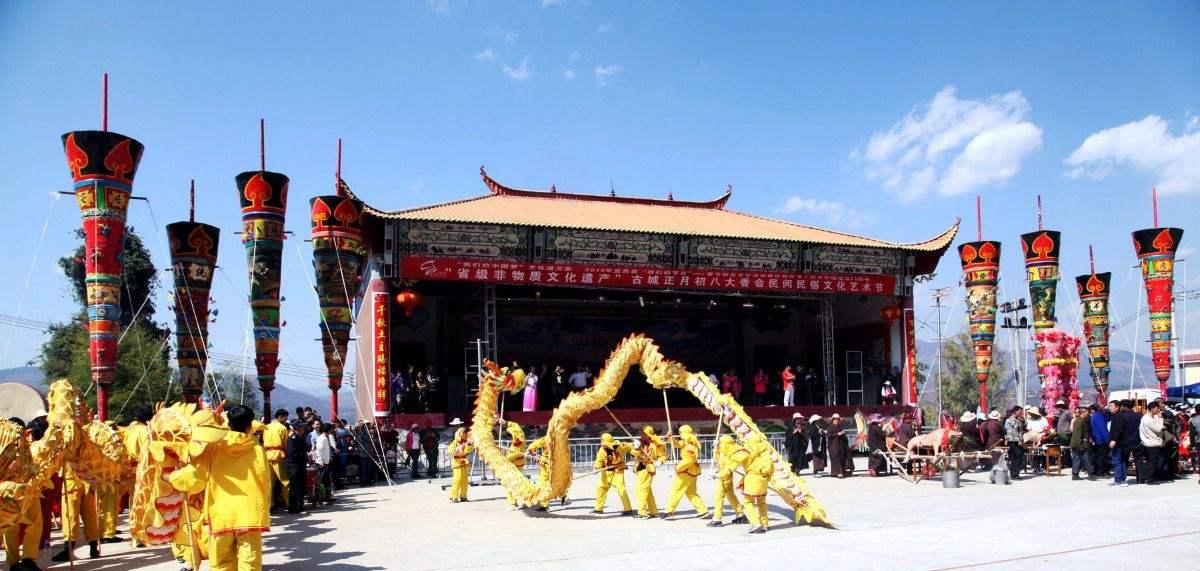tale:
During the Chenghua period of the Ming Dynasty, the Duke of Qianguo passed by the ancient city of Yiliang North and saw a man, wearing a black hat and red clothes, respectfully greeting him on the side of the road. And the people around Qianguo Gong could not see this person.
Qianguo Gong asked: Is there a shrine temple on this mountain? The fellow replied: There is a temple of the lord of the earth, praying for the birth of a child is the most spiritual. At that time, the Duke of Qianguo happened to have no heirs, so he went into the temple to pray.
After a long time, the lady was still not pregnant, the Duke of Qianguo was angry, wanted to destroy the temple of the lord of the earth, and had a dream at night, dreaming that the gods told him that there should be a meritorious and benevolent and generous person born in your house, please do not worry about getting a child later. Later, Madame was indeed pregnant and had been a month.
One day, when the Duke of Qianguo was on official business in the hall of the Gonggong Mansion, a monk came in, disappeared in the blink of an eye, and then the family reported that madame had given birth to a son!
When his son grew up, he was intelligent and erudite and established many meritorious achievements.
(Derived from the Qianlong edition of Yiliang County Chronicle)

Historical Truth:
During the Chenghua period, the Duke of Qianguo was Mu Chun (1449-1496). Mu Chun was childless, and after the death of Hongzhi in the ninth year (1496), his nephews Mu Cheng, Mu Qian, Mu Qian, Mu Zhen, etc. either died or were childless. The military and civilians of Yunnan wrote to the imperial court, requesting permission from Mu Kun's nephew, Mu Kun, the son of his nephew Mu Cheng, to inherit the dukedom of Qianguo, and was allowed by the imperial court.
Before his death, Mu Cheng had already passed on to his nephew Mu Cheng's son Mu Kun, who died when his son Mu Kun was only nine months old. Mu Cheng is the grandson of Mu Sheng, Mu Cheng is the great-grandson of Mu Ang, and Mu Kun is the fifth grandson of Mu Ang.
Since then, the lineage of the Duke of Qianguo has been transferred from Mu Ying's second son Mu Sheng to the third son Mu Ang.
After Mu Kun inherited the title of Duke of Qianguo, he took charge of the yunnan general army, added the seal of the general Zhengnan, and in the second year of Zhengde (1507), he quelled the rebellion of the native Aben of Shizong Prefecture. In the seventh year of Zhengde (1512), the rebellion of the Annam Governor (the seat of government was located in the Great Black Mountain, Laozhai Village, Laozhai Township, Mengzi City, Honghe Prefecture, Yunnan Province) Tushe (a tuguan of lower rank than the toastmaster), and zhengde was given the title of prince taifu for his merits.
Continuing the tradition of building water conservancy in the ancestors, in the fifteenth year of Hongzhi (1503), Mu Kun presided over the construction of the Haikou River in Kunming. Dams and barriers were built, canals were dug, and many flooded lands were restored.
Mu Kun loved Wen Mo very much, and selected and published the poetry collection "Su Xuan Collection" by his grandfather Mu Ang, and later he also had a poetry collection "Yugang Poetry Collection" printed, but he never lost his mind. Every day, the official wears the body and is diligent in government affairs. Mu Kunzhen has been guarding Yunnan for twenty-one years, and it has always been like this.
According to the "History of Ming", in the late Dian dynasty of Mu Kunzhen, he became arrogant and arrogant, and was impeached by many officials, but the emperor remembered the merits of Mu's ancestors and protected him.
In the fourteenth year of Zhengde (1519), Mu Kun died at the age of thirty-eight, and Emperor Mingwu Zhu Houzhao quit the dynasty for one day. In the sixteenth year of Zhengde (1521), Emperor Mingshizong Posthumously presented Mu Kunte into Guanglu Dafu, Right Pillar Guo, Taishi, and Zhuang Xiang.
Judging from these performances, Mu Kun fits the prophecy and commentary of the story "There should be a person who has established merit and benevolence and generosity will be born in your home," "Intelligent and erudite, and has established many meritorious deeds."